-
RESEARCH
Technology-dependent children and the demand for pharmaceutical care
Revista Brasileira de Enfermagem. 2016;69(4):718-724
01-01-2016
Abstract
RESEARCHTechnology-dependent children and the demand for pharmaceutical care
Revista Brasileira de Enfermagem. 2016;69(4):718-724
01-01-2016DOI 10.1590/0034-7167.2016690415i
Views0See moreABSTRACT
Objective:
to understand the experience of mothers of technology-dependent children as regards pharmaceutical care.
Method:
this was a qualitative, descriptive-exploratory study developed based on open interviews using a structured characterization tool, and applied during home visits to 12 mothers caring for technology-dependent children. The data was submitted to inductive content analysis.
Results:
this study is split into two themes: (i) maternal overload during pharmaceutical care, demonstrating the need to administer drugs continuously and the repercussions of this exhaustive care on the caregivers; (ii) the ease or difficulty of access to the medicines required, showing informal strategies and support networks.
Conclusion:
pharmaceutical care is a daily challenge expressed in maternal overload and difficulty accessing the drugs, made worse by failures in the care network and coordinated care.
-
RESEARCH
Fasting of less than eight hours in urgent and emergency surgeries versus complication
Revista Brasileira de Enfermagem. 2016;69(4):712-717
01-01-2016
Abstract
RESEARCHFasting of less than eight hours in urgent and emergency surgeries versus complication
Revista Brasileira de Enfermagem. 2016;69(4):712-717
01-01-2016DOI 10.1590/0034-7167.2016690414i
Views0See moreABSTRACT
Objective:
to verify the occurrence of intraoperative and postoperative complications in patients undergoing urgent and emergency surgical procedures between January and December 2012, with fasting time of less than 8 hours.
Method:
a quantitative study was conducted, of the retrospective cohort type, through the analysis of medical records.
Results:
we included 181 records of patients undergoing surgical procedures with average duration of 59.4 minutes. Fractures correction surgeries stood out, totalling 32% of cases. We observed complications in 36 patients (19.9%), vomiting being the most prevalent (47.2%); followed by nausea (16.7%); need for blood transfusion (13.9%); surgical site infection (11.1%); and death (11.1%). The average fasting time was 133.5 minutes. The fasting time showed no statistically significant correlation with the complications investigated.
Conclusion:
intraoperative and postoperative complications were associated with the clinical conditions of the patients and not with the fasting time.
-
RESEARCH
Validation to Portuguese of the Debriefing Experience Scale
Revista Brasileira de Enfermagem. 2016;69(4):705-711
01-01-2016
Abstract
RESEARCHValidation to Portuguese of the Debriefing Experience Scale
Revista Brasileira de Enfermagem. 2016;69(4):705-711
01-01-2016DOI 10.1590/0034-7167.2016690413i
Views1See moreABSTRACT
Objective:
to translate and validate to Portuguese the Debriefing Experience Scale jointly with individuals that used high-fidelity simulation in learning.
Method:
methodological and exploratory study for an instrument translation and validation. For the validation process, the event “III Workshop Brazil – Portugal: Care Delivery to Critical Patients” was created.
Results:
103 nurses attended. Validity and reliability of the scale, the correlation pattern among variables, the sampling adequacy test, and the sphericity test showed good results. Since there was no relationship among the groups established in the exploratory factor analysis, the option was to follow the division established by the original version.
Conclusion:
the version of the instrument was called Escala de Experiência com o Debriefing. The results showed good psychometric properties and a good potential for use. However, further studies will contribute to consolidate the validity of the scale and strengthen its potential use.
-
RESEARCH
Factor analysis of an instrument to measure the impact of disease on daily life
Revista Brasileira de Enfermagem. 2016;69(4):697-704
01-01-2016
Abstract
RESEARCHFactor analysis of an instrument to measure the impact of disease on daily life
Revista Brasileira de Enfermagem. 2016;69(4):697-704
01-01-2016DOI 10.1590/0034-7167.2016690412i
Views0See moreABSTRACT
Objective:
to verify the structure of factors of an instrument to measure the Heart Valve Disease Impact on Daily Life (IDCV) when applied to coronary artery disease patients.
Method:
the study included 153 coronary artery disease patients undergoing outpatient follow-up care. The IDCV structure of factors was initially assessed by means of confirmatory factor analysis and, subsequently, by exploratory factor analysis. The Varimax rotation method was used to estimate the main components of analysis, eigenvalues greater than one for extraction of factors, and factor loading greater than 0.40 for selection of items. Internal consistency was estimated using Cronbach’s alpha coefficient. Results: confirmatory factor analysis did not confirm the original structure of factors of the IDCV. Exploratory factor analysis showed three dimensions, which together explained 78% of the measurement variance.
Conclusion:
future studies with expansion of case selection are necessary to confirm the IDCV new structure of factors.
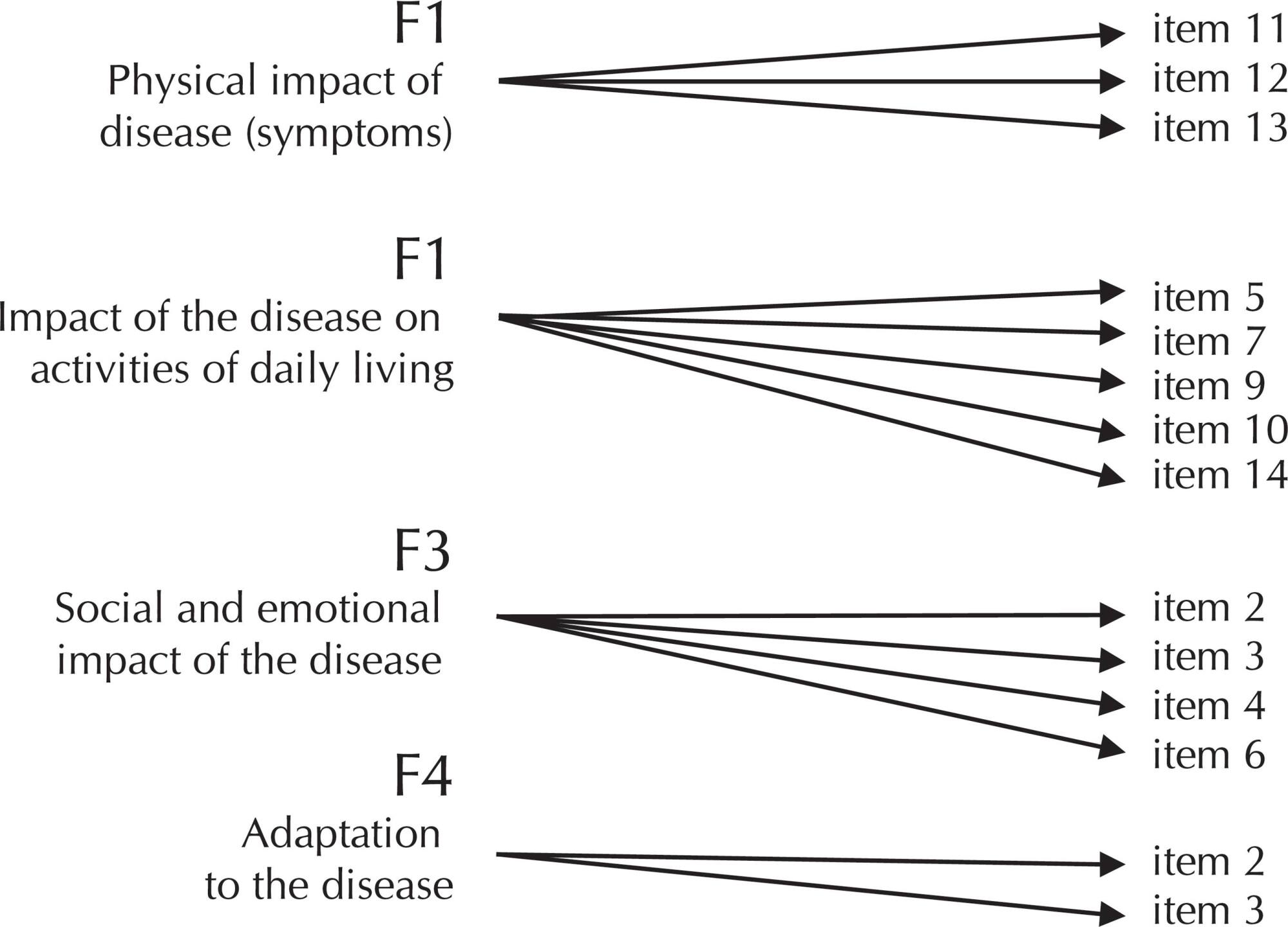
-
RESEARCH
Association of frailty in hospitalized and institutionalized elderly in the community-dwelling
Revista Brasileira de Enfermagem. 2016;69(4):691-696
01-01-2016
Abstract
RESEARCHAssociation of frailty in hospitalized and institutionalized elderly in the community-dwelling
Revista Brasileira de Enfermagem. 2016;69(4):691-696
01-01-2016DOI 10.1590/0034-7167.2016690411i
Views0See moreABSTRACT
Objective:
to investigate the association between frailty with hospitalization and institutionalization in a follow-up study of elderly residents.
Method:
the follow-up study was performed in 2008 and 2013 with elderly of both genders, aged 65 years and older who were living in the community-dwelling. The sampling procedure performed was probabilistic, with dual-stage clustering. In 2008, 515 elderly people were interviewed and, in 2013, 262. We used the socioeconomic and demographic data, self-reported morbidity, specific data of hospitalization and institutionalization. Frailty was measured by the Edmonton Frail Scale (EFS), and functional capacity through the Functional Independence Measure.
Results:
we found the mean gross EFS score was higher among resident elderly who were hospitalized and institutionalized and was statistically significant in both investigated years.
Conclusion:
the confirmation of association between frailty and hospitalization and institutionalization reinforces the importance of the subject, and highlights frailty as an important tool for risk estimates for these adverse events.
-
RESEARCH
Associação da fragilidade em idosos internados e institucionalizados na comunidade
Revista Brasileira de Enfermagem. 2016;69(4):691-696
01-01-2016
Abstract
RESEARCHAssociação da fragilidade em idosos internados e institucionalizados na comunidade
Revista Brasileira de Enfermagem. 2016;69(4):691-696
01-01-2016DOI 10.1590/0034-7167.2016690411i
Views0See moreRESUMEN
Objetivo:
investigar la asociación entre la fragilidad y la internación e institucionalización, en un estudio de acompañamiento de residentes ancianos.
Método:
el estudio de acompañamiento fue realizado en 2008 y 2013, con ancianos de ambos sexos, de 65 años o más, los cuales vivían en la comunidad. El procedimiento de muestreo realizado fue probabilístico, con agrupamiento en dos etapas. Fueron entrevistados 512 ancianos en 2008 y 262 en 2013. Datos socioeconómicos y demográficos, morbilidad relatada por los mismos y datos específicos de internación e institucionalización han sido utilizados. La fragilidad fue medida por la escala Edmond Frail Scale (EFS) y la capacidad funcional por la escala Functional Independence Measure (FIM).
Resultados:
El promedio de la puntuación EFS fue mayor entre los residentes ancianos que fueron internados y hospitalizados, siendo estadísticamente significativa en los dos años investigados.
Conclusión:
La confirmación de la asociación entre la fragilidad y la internación e institucionalización refuerza la importancia del tema y enfatiza la fragilidad como un instrumento importante en la evaluación de los riesgos para estos eventos adversos.
-
RESEARCH
Analysis of managerial and healthcare indicators after nursing personnel upsizing
Revista Brasileira de Enfermagem. 2016;69(4):684-690
01-01-2016
Abstract
RESEARCHAnalysis of managerial and healthcare indicators after nursing personnel upsizing
Revista Brasileira de Enfermagem. 2016;69(4):684-690
01-01-2016DOI 10.1590/0034-7167.2016690410i
Views0ABSTRACT
Objective:
analyze healthcare and managerial indicators after nursing personnel upsizing.
Method:
a retrospective, descriptive study was conducted using data from computer systems of a university hospital in southern Brazil. Healthcare and managerial indicators related to the first half of 2013 and 2014 were statistically analyzed.
Results:
increases of 40.0% in the number of nurses and 16.0% in the number of nursing technicians led to reductions of 12.0% in the number of sickness absences, 21.8% in positive balance for compensatory time off, 92.0% in paid overtime. Reductions of 75.0% in pressure ulcer rates, 10.5% in the number of falls and 50.0% in infections due to indwelling catheter use were also observed.
Conclusion:
nursing staff upsizing caused a positive impact on managerial and healthcare indicators and helped qualify care and improve work conditions for the nursing team.
Keywords:AbsenteeismHealth Care Quality IndicatorsHospital Nursing StaffHospital Personnel AdministrationPatient SafetySee more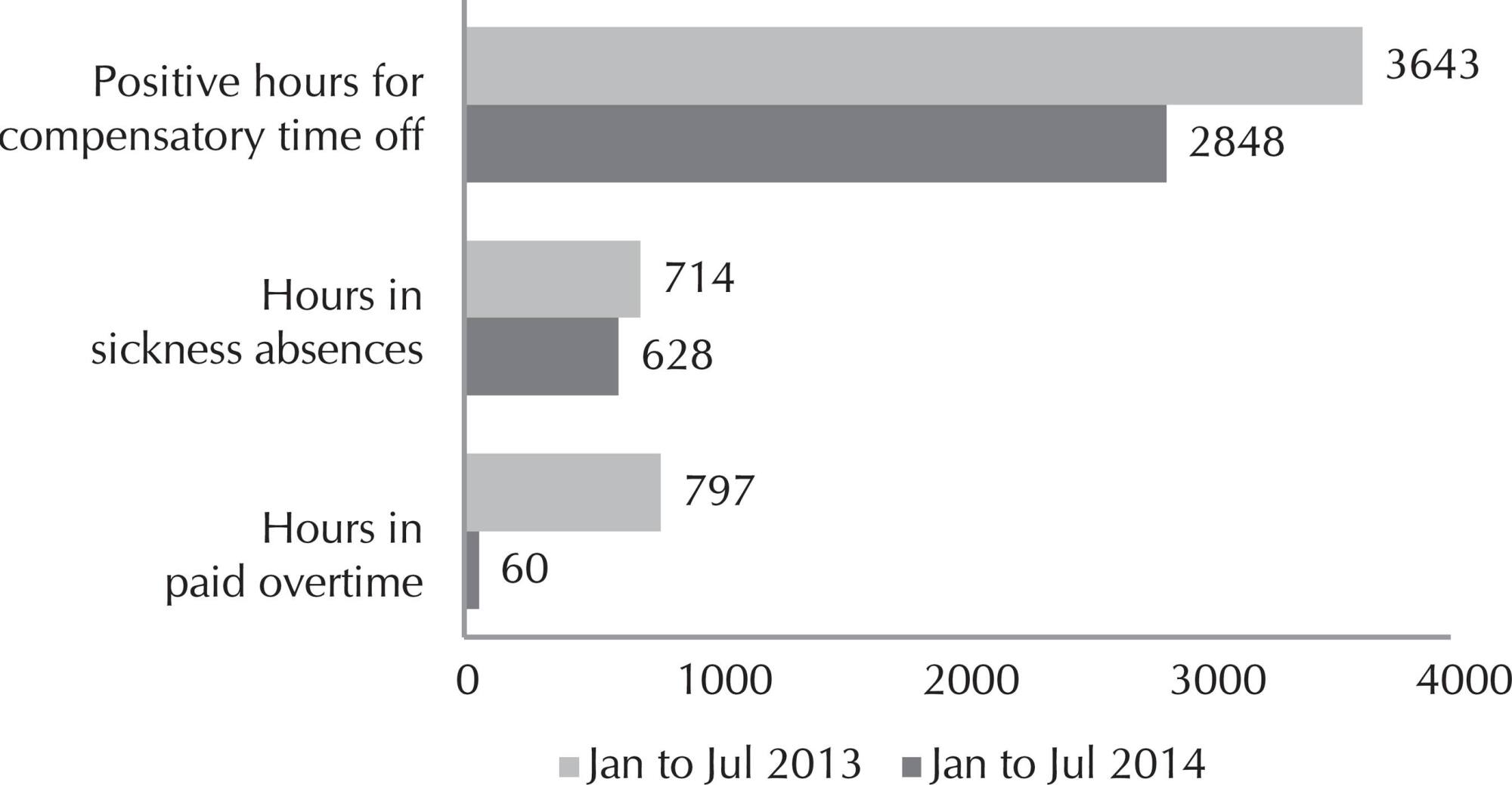
-
RESEARCH
Nurses’ managerial knowledge in the hospital setting
Revista Brasileira de Enfermagem. 2016;69(4):676-683
01-01-2016
Abstract
RESEARCHNurses’ managerial knowledge in the hospital setting
Revista Brasileira de Enfermagem. 2016;69(4):676-683
01-01-2016DOI 10.1590/0034-7167.2016690409i
Views0See moreABSTRACT
Objective:
to analyze nurses’ managerial skills in the hospital setting, their perception of their own education and the relevance of training for their professional practice.
Method:
qualitative study based on the dialectical hermeneutics framework. Thirty-two nurses from three hospitals in the Brazilian state of Minas Gerais contributed to the study by taking part in six focus groups. Records were transcribed and three categories emerged from content analysis.
Results:
results evidenced the following managerial skills: supervision, leadership, decision making, planning and organization, as well as the relevance of education centers for their improvement and the continuing development of the nurses’ managerial skills.
Conclusion:
the authors believe this investigation will contribute for the improvement of nurses’ necessary managerial skills and also to identify gaps in this area of their education.
-
ORIGINAL ARTICLE
Changes implemented in the work environment of nurses in the COVID-19 pandemic
Revista Brasileira de Enfermagem. 2022;75:e20201381
11-29-2022
Abstract
ORIGINAL ARTICLEChanges implemented in the work environment of nurses in the COVID-19 pandemic
Revista Brasileira de Enfermagem. 2022;75:e20201381
11-29-2022DOI 10.1590/0034-7167-2020-1381
Views0See moreABSTRACT
Objective:
to describe the changes implemented in the work environment of nurses in university hospitals considering the COVID-19 pandemic.
Methods:
this qualitative and descriptive research was developed from an online survey with 75 nurses from three Brazilian university hospitals. Data processing occurred through textual analysis with the aid of software IRAMUTEQ.
Results:
five semantic classes were obtained: Organization of units for exclusive care of patients with COVID-19; Adaptations in the use of personal protective equipment; Physical structure adaptation; Care flow institution; Increased number of beds and training courses. Final considerations: the results show the effort of healthcare and nursing professionals/managers in the development of structural adaptations and reorganizations of care processes, in the hospital context, to respond with quality and efficiency to the demands arising from the COVID-19 pandemic.
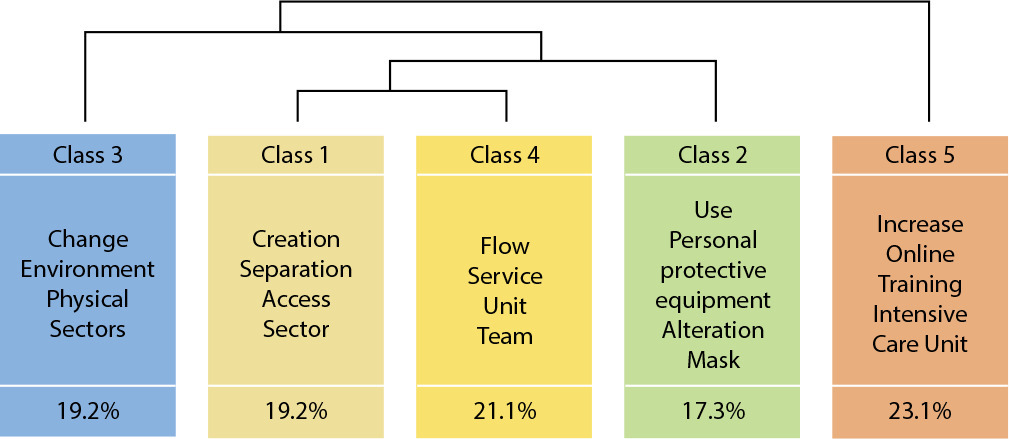
-
ORIGINAL ARTICLE
Permanent education for good practices in the prevention of pressure injury: almost-experiment
Revista Brasileira de Enfermagem. 2019;72(6):1646-1652
10-21-2019
Abstract
ORIGINAL ARTICLEPermanent education for good practices in the prevention of pressure injury: almost-experiment
Revista Brasileira de Enfermagem. 2019;72(6):1646-1652
10-21-2019DOI 10.1590/0034-7167-2018-0778
Views0See moreABSTRACT
Objective:
To verify the effectiveness of the educational intervention through the evaluation of nurses’ knowledge about prevention of pressure injury.
Method:
A quasi-experimental study with a single group, carried out with 95 nurses from a teaching hospital in the interior of Minas Gerais, in August and September 2017. As a teaching strategy, the active methodology and hybrid teaching were used, based on the reference of the Method of the Arch of Charles Maguerez. Data were collected from a validated instrument, called the Pieper Knowledge Test, and analyzed by descriptive statistics and Student’s t-test with significance level of p <0.001.
Results:
The mean number of correct answers obtained by the nurses was 78.8% in the pre-test and 88.8% in the post-test, and the difference was statistically significant (p <0.001).
Conclusion:
The educational intervention developed was effective, since it contributed to the improvement of nurses’ knowledge.

-
ORIGINAL ARTICLE
Nurse care for the hospitalized elderly’s spiritual dimension
Revista Brasileira de Enfermagem. 2019;72:236-242
12-05-2019
Abstract
ORIGINAL ARTICLENurse care for the hospitalized elderly’s spiritual dimension
Revista Brasileira de Enfermagem. 2019;72:236-242
12-05-2019DOI 10.1590/0034-7167-2018-0685
Views0See moreABSTRACT
Objective:
to analyze the nurse care for the spiritual hospitalized elderly’s dimension.
Method:
a qualitative study, based on Jean Watson’s Theory of Human Caring. The study included 17 nurses working in a geriatric center in Salvador City, Bahia State, Brazil. The collection of testimonies occurred between January and April of 2018, through an interview.
Results:
spiritual care were dialogue, encouragement and respect for religious activities, embracement, empathy. One of the obstacles to providing this care was the lack of preparation in accessing the elderly’s spiritual dimension.
Final considerations:
spirituality is a dimension of human and holistic nursing care. Caring for the spirit contributes to foster transpersonal care. The difficulty may be in the lack of nurses’ preparation. It is necessary that they cultivate and live their own spirituality, transmitting the understanding in each care relationship.
-
EXPERIENCE REPORT
Use of webQDA software on qualitative nursing research: an experience report
Revista Brasileira de Enfermagem. 2020;73(3):e20180411
04-03-2020
Abstract
EXPERIENCE REPORTUse of webQDA software on qualitative nursing research: an experience report
Revista Brasileira de Enfermagem. 2020;73(3):e20180411
04-03-2020DOI 10.1590/0034-7167-2018-0411
Views0See moreABSTRACT
Objectives:
to report the user experience of the webQDA software in the support of qualitative data analysis about health literacy of older adults.
Methods:
quasi-experimental research developed from January 2014 to January 2015, with 118 older adults, all of whom were interviewed to assess the level of health literacy. Interviews were carried out before and after four educational interventions, according to Freire’s method named Culture Circle. The interviews were transcribed and entered in the software, which highlighted the analytical categories.
Results:
the systems of sources, interpretative encoding and questioning of the data available in the software allowed the construction of three categories for the literacy levels and four categories for their dimensions.
Final considerations:
We concluded that the webQDA software enables the structured encoding of qualitative materials, ensuring faster and effective management of data with systematization and analytical transparency.

-
Concept analysis of Perioperative Thirst for the development of a new nursing diagnosis
Revista Brasileira de Enfermagem. 2021;74(1):e20200065
03-03-2021
Abstract
Concept analysis of Perioperative Thirst for the development of a new nursing diagnosis
Revista Brasileira de Enfermagem. 2021;74(1):e20200065
03-03-2021DOI 10.1590/0034-7167-2020-0065
Views0See moreABSTRACT
Objectives:
to analyze the perioperative thirst concept for the development of a new diagnostic structure according to NANDA International.
Methods:
a concept analysis study based on the framework proposed by Walker and Avant, instrumentalized through an integrative literature review based on SCOPUS, CINAHL, PUBMED, LILACS, and WOS. The elaboration of the diagnostic structure followed NANDA International guidelines.
Results:
41 studies were analyzed revealing that perioperative thirst is prevalent and intense, having visceral and behavioral attributes as the core of the concept. Antecedents indicate that surgical patients are vulnerable to thirst; and consequents 16 signs and symptoms were organized and model cases were developed. A diagnostic structure has been developed for perioperative thirst.
Final Considerations:
concept analysis allowed language standardization that describes thirsty patients, helping the identification, planning of actions and communication of perioperative nursing care.
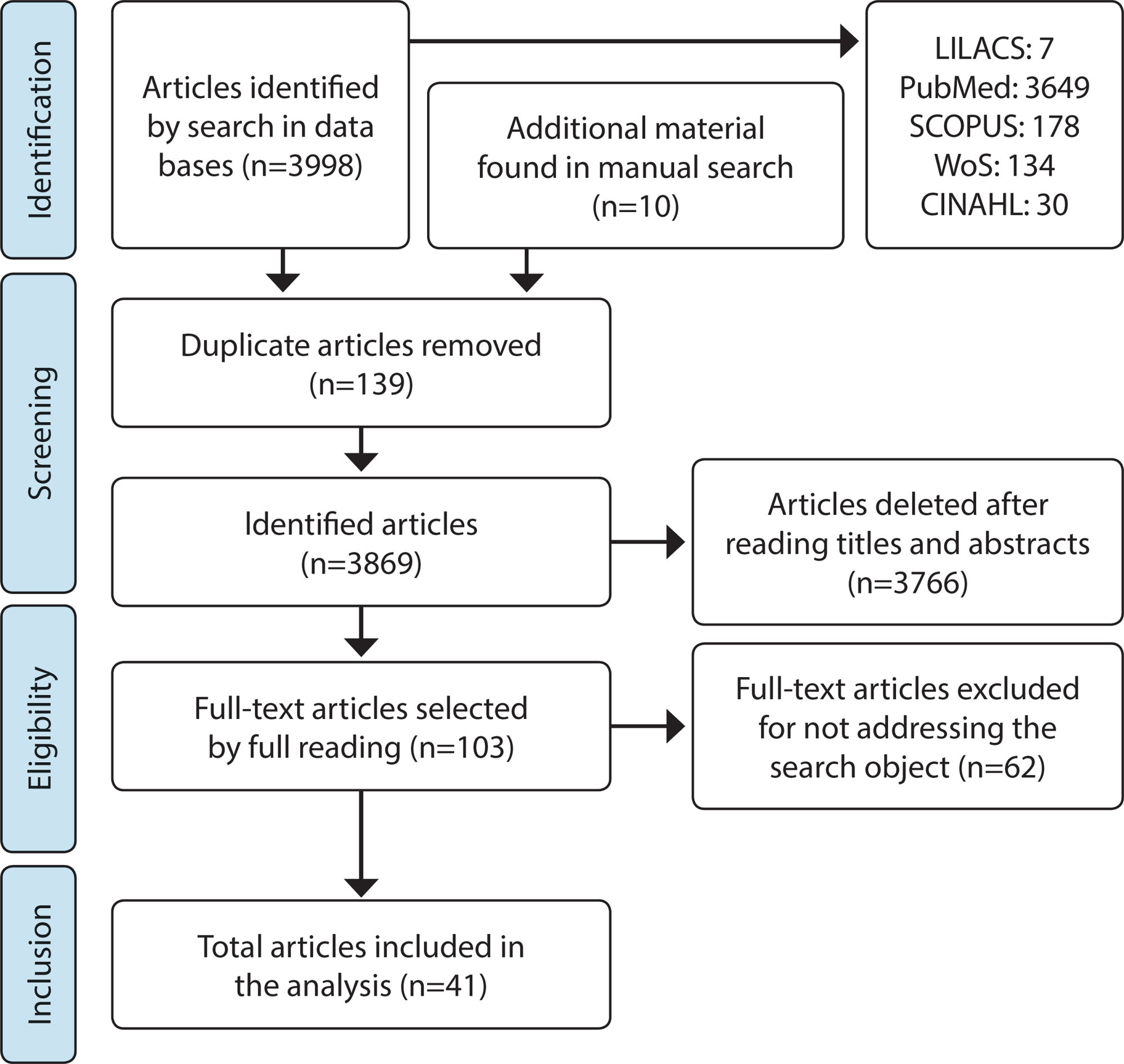
-
REFLECTION
Nursing Process in the Brazilian context: reflection on its concept and legislation
Revista Brasileira de Enfermagem. 2022;75(6):e20210898
05-11-2022
Abstract
REFLECTIONNursing Process in the Brazilian context: reflection on its concept and legislation
Revista Brasileira de Enfermagem. 2022;75(6):e20210898
05-11-2022DOI 10.1590/0034-7167-2021-0898
Views0ABSTRACT
Objectives:
to reflect on the global understanding of the Nursing Process concept, with emphasis on the Brazilian context.
Methods:
a reflection article, aligned with the vision and expertise of researchers who are members of the Nursing Process Research Network.
Results:
the reflection is presented in two main topics: The evolution of Systematization of Nursing Care X Nursing Process concepts and its consonance with national and international practices, and Brazilian legislation; The Nursing Process concept realignment in Brazilian legislation in line with current care, teaching and research practices. Final Considerations: the reflections were oriented to the Nursing Process’ conceptual, normative and legal issues, including elements of its historical evolution, and, with that, pointed to the need to modify the Brazilian regulation on the Nursing Process.
Keywords:Education, NursingLegislationNursingNursing CareNursing ProcessStandardized Nursing TerminologySee more -
ORIGINAL ARTICLE
Creation and validation of a visual educational technology content for lactation physiology learning
Revista Brasileira de Enfermagem. 2020;73(6):e20190564
09-07-2020
Abstract
ORIGINAL ARTICLECreation and validation of a visual educational technology content for lactation physiology learning
Revista Brasileira de Enfermagem. 2020;73(6):e20190564
09-07-2020DOI 10.1590/0034-7167-2019-0564
Views0ABSTRACT
Objective:
to create and validate a visual educational technology content for lactation physiology learning.
Method:
a methodological study that contemplated the stages of content creation and validation guided by the conceptual model of Knowledge Translation into action. The creation took place in partnership with the educational technology center of the project’s home institution. The validation was attended by 27 judges with experience in the obstetric, neonatal, pediatric or maternal and child areas and in the theme of breastfeeding.
Results:
an educational technology covered animation and video techniques to locate, respectively, elements of lactation physiology and the population involved. An Overall Content Validity Index of 0.84 was obtained.
Conclusion:
the visual educational technology for lactation physiology learning has been validated in content as a tool to introduce the theme and mediate health education actions that can have a positive impact on breastfeeding.
Keywords:Audiovisual ResourcesEducational TechnologyHealth EducationLactationTranslational Medical ResearchSee more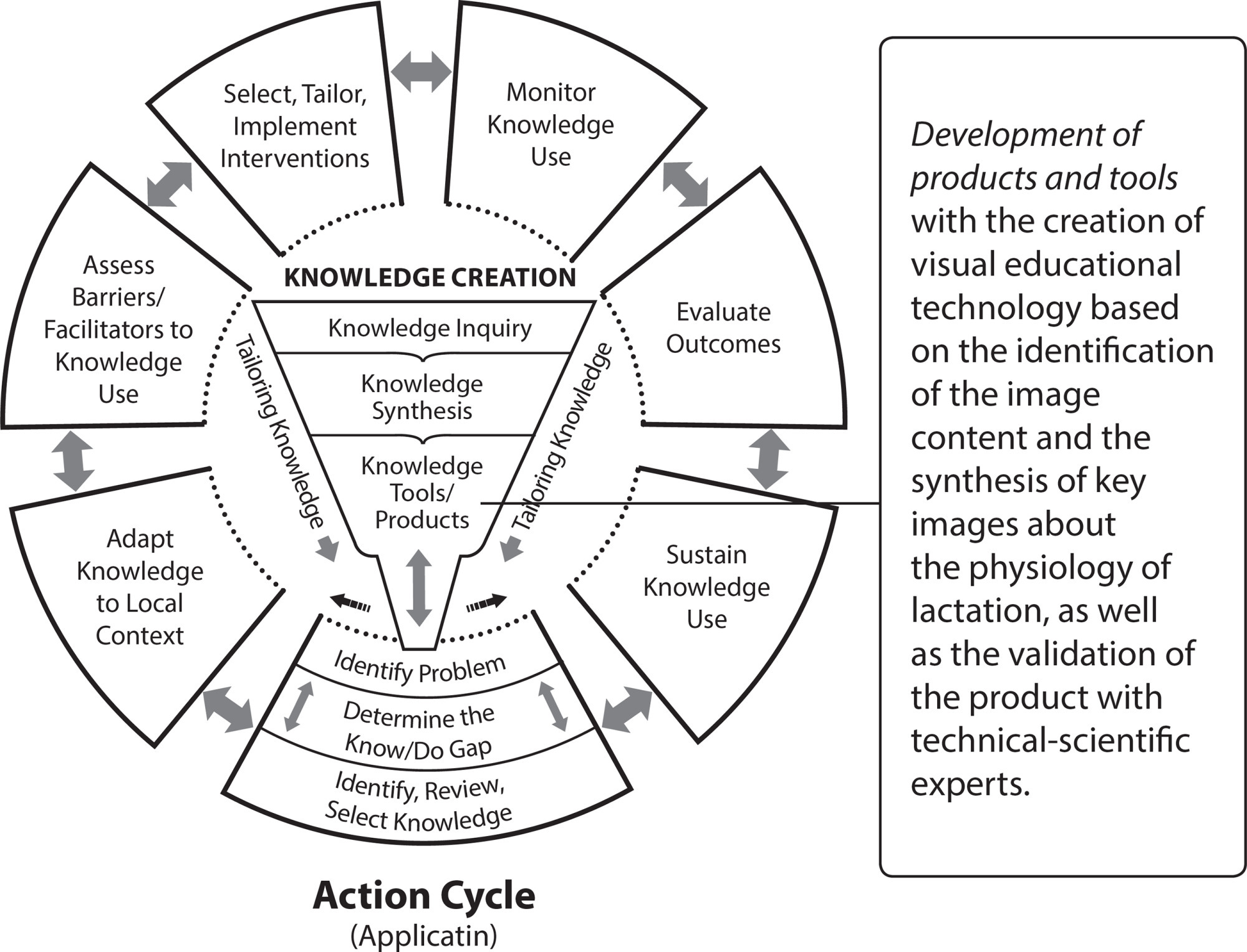
-
ORIGINAL ARTICLE
Risk of suicide among nursing students
Revista Brasileira de Enfermagem. 2021;74(6):e20200867
08-20-2021
Abstract
ORIGINAL ARTICLERisk of suicide among nursing students
Revista Brasileira de Enfermagem. 2021;74(6):e20200867
08-20-2021DOI 10.1590/0034-7167-2020-0867
Views0See moreABSTRACT
Objectives:
to identify the risk and degree of risk of suicide in nursing students of a public institution in the countryside of Pernambuco, Brazil.
Methods:
this was a cross-sectional, quantitative research conducted with 150 students. For data collection, a sociodemographic questionnaire and the instrument, M.I.N.I. – Brazilian version 5.0.0 – Module C – Risk of suicide were used. Statistical analyses were performed with IBM(® )SPSS(®), version 23.
Results:
53.3% of nursing students had a risk of suicide, of which 20.7% had a high risk. Moreover, 22.67% reported previous suicide attempt. It is noteworthy that students without a partner have a higher risk of suicide (56.8%) than those with a partner (29.4%).
Conclusions:
it is perceived the need to develop programs that identify students at risk of suicide in higher education institutions, in order to raise awareness of the problem and implement policies to promote mental health in the academia.
Search
Search in:
Nuvem de Tags
Aged (144) Atenção Primária à Saúde (239) COVID-19 (104) Cuidados de Enfermagem (269) Educação em Enfermagem (151) Educação em Saúde (139) Enfermagem (930) Estudos de Validação (131) Health Education (144) Idoso (208) Mental Health (149) Nursing (987) Nursing Care (306) Patient Safety (151) Primary Health Care (284) Qualidade de Vida (104) Quality of Life (106) Saúde Mental (145) Segurança do Paciente (150) Validation Studies (108)



